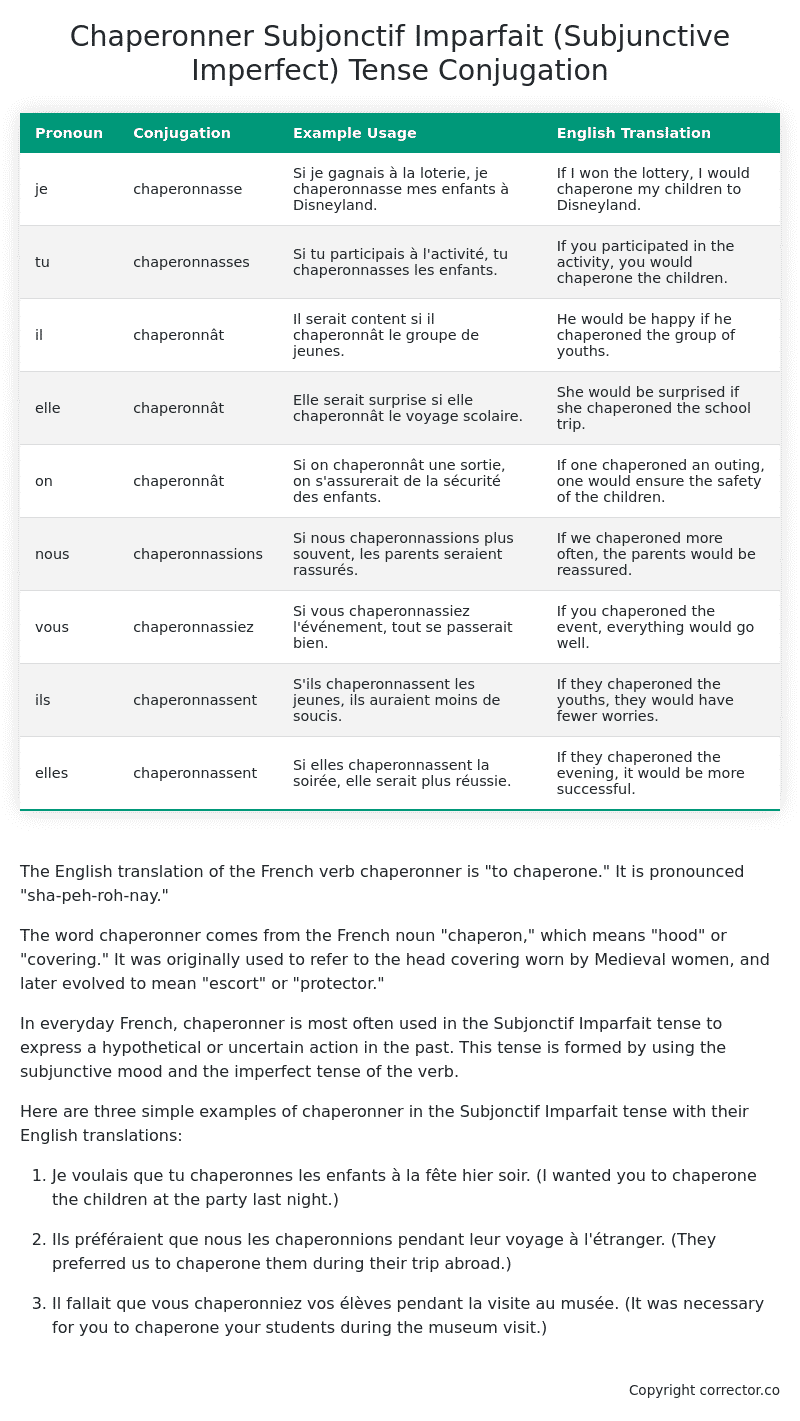Subjonctif Imparfait (Subjunctive Imperfect) Tense Conjugation of the French Verb chaperonner
Introduction to the verb chaperonner
The English translation of the French verb chaperonner is “to chaperone.” It is pronounced “sha-peh-roh-nay.”
The word chaperonner comes from the French noun “chaperon,” which means “hood” or “covering.” It was originally used to refer to the head covering worn by Medieval women, and later evolved to mean “escort” or “protector.”
In everyday French, chaperonner is most often used in the Subjonctif Imparfait tense to express a hypothetical or uncertain action in the past. This tense is formed by using the subjunctive mood and the imperfect tense of the verb.
Here are three simple examples of chaperonner in the Subjonctif Imparfait tense with their English translations:
-
Je voulais que tu chaperonnes les enfants à la fête hier soir. (I wanted you to chaperone the children at the party last night.)
-
Ils préféraient que nous les chaperonnions pendant leur voyage à l’étranger. (They preferred us to chaperone them during their trip abroad.)
-
Il fallait que vous chaperonniez vos élèves pendant la visite au musée. (It was necessary for you to chaperone your students during the museum visit.)
Table of the Subjonctif Imparfait (Subjunctive Imperfect) Tense Conjugation of chaperonner
| Pronoun | Conjugation | Example Usage | English Translation |
|---|---|---|---|
| je | chaperonnasse | Si je gagnais à la loterie, je chaperonnasse mes enfants à Disneyland. | If I won the lottery, I would chaperone my children to Disneyland. |
| tu | chaperonnasses | Si tu participais à l’activité, tu chaperonnasses les enfants. | If you participated in the activity, you would chaperone the children. |
| il | chaperonnât | Il serait content si il chaperonnât le groupe de jeunes. | He would be happy if he chaperoned the group of youths. |
| elle | chaperonnât | Elle serait surprise si elle chaperonnât le voyage scolaire. | She would be surprised if she chaperoned the school trip. |
| on | chaperonnât | Si on chaperonnât une sortie, on s’assurerait de la sécurité des enfants. | If one chaperoned an outing, one would ensure the safety of the children. |
| nous | chaperonnassions | Si nous chaperonnassions plus souvent, les parents seraient rassurés. | If we chaperoned more often, the parents would be reassured. |
| vous | chaperonnassiez | Si vous chaperonnassiez l’événement, tout se passerait bien. | If you chaperoned the event, everything would go well. |
| ils | chaperonnassent | S’ils chaperonnassent les jeunes, ils auraient moins de soucis. | If they chaperoned the youths, they would have fewer worries. |
| elles | chaperonnassent | Si elles chaperonnassent la soirée, elle serait plus réussie. | If they chaperoned the evening, it would be more successful. |
Other Conjugations for Chaperonner.
Le Present (Present Tense) Conjugation of the French Verb chaperonner
Imparfait (Imperfect) Tense Conjugation of the French Verb chaperonner
Passé Simple (Simple Past) Tense Conjugation of the French Verb chaperonner
Passé Composé (Present Perfect) Tense Conjugation of the French Verb chaperonner
Futur Simple (Simple Future) Tense Conjugation of the French Verb chaperonner
Futur Proche (Near Future) Tense Conjugation of the French Verb chaperonner
Plus-que-parfait (Pluperfect) Tense Conjugation of the French Verb chaperonner
Passé Antérieur (Past Anterior) Tense Conjugation of the French Verb chaperonner
Futur Antérieur (Future Anterior) Tense Conjugation of the French Verb chaperonner
Subjonctif Présent (Subjunctive Present) Tense Conjugation of the French Verb chaperonner
Subjonctif Passé (Subjunctive Past) Tense Conjugation of the French Verb chaperonner
Subjonctif Imparfait (Subjunctive Imperfect) Tense Conjugation of the French Verb chaperonner (this article)
Conditionnel Présent (Conditional Present) Tense Conjugation of the French Verb chaperonner
Conditionnel Passé (Conditional Past) Tense Conjugation of the French Verb chaperonner
L’impératif Présent (Imperative Present) Tense Conjugation of the French Verb chaperonner
L’infinitif Présent (Infinitive Present) Tense Conjugation of the French Verb chaperonner
Struggling with French verbs or the language in general? Why not use our free French Grammar Checker – no registration required!
Get a FREE Download Study Sheet of this Conjugation 🔥
Simply right click the image below, click “save image” and get your free reference for the chaperonner Subjonctif Imparfait tense conjugation!

Chaperonner – About the French Subjonctif Imparfait (Subjunctive Imperfect) Tense
Formation
Common Everyday Usage Patterns
Interactions with Other Tenses
Subjonctif Présent
Indicatif Passé Composé
Conditional
Conditional Perfect
Summary
I hope you enjoyed this article on the verb chaperonner. Still in a learning mood? Check out another TOTALLY random French verb conjugation!


